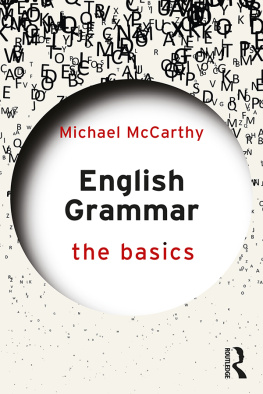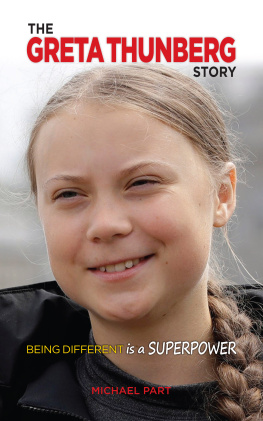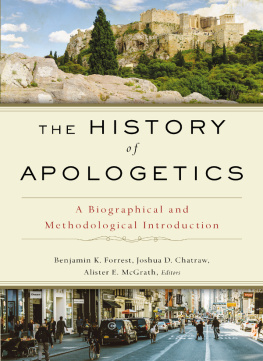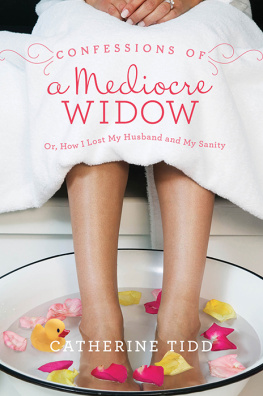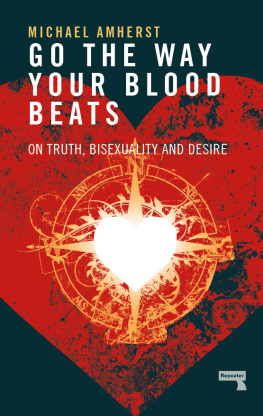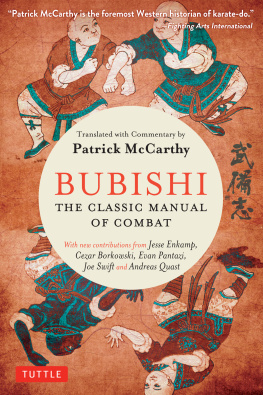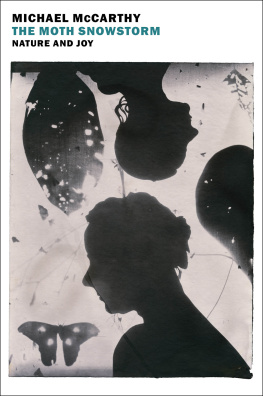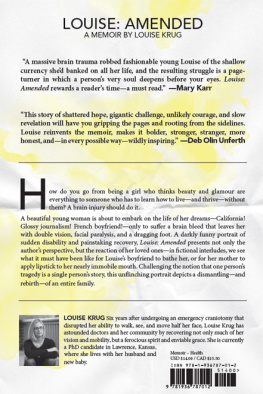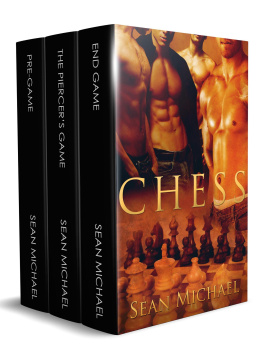Published by The Poetry Business
Campo House,
54 Campo Lane,
Sheffield S1 2EG
www.poetrybusiness.co.uk
Copyright Michael McCarthy Literary Estate 2021
The moral rights of the author have been asserted.
All rights reserved.
Without limiting the rights under copyright reserved above, no part of this publication may be reproduced, storied in or introduced into a retrieval system, or transmitted, in any form or by any means (electronic, mechanical, photocopying, recording or otherwise), without the prior written permission of both the copyright owner and the above publisher of this book.
The publishers are grateful for the encouragement and support of Carlow College.
Designed & typeset by The Poetry Business.
Cover Image: The Orchard by Donagh Carey ( www.donaghcarey.com )
British Library Cataloguing-in-Publication Data.
A catalogue record for this book is available from the British Library.
Smith|Doorstop is a member of Inpress
www.inpressbooks.co.uk .
Distributed by NBN International, 1 Deltic Avenue,
Rooksley, Milton Keynes MK13 8LD.
ISBN 978-1-912196-36-4
eBook ISBN 978-1-912196-49-4
The Poetry Business gratefully acknowledges the support of Arts Council England.
Like A Tree Cut Back combines two biographies in one: it interweaves the life of Michael McCarthy and the history of Carlow College, St Patricks, in Ireland. The College motto, rescissa vegetior assurgit that which is cut back burgeons forth more abundantly encapsulates essential features of both.
The book opens with The Accident that cut short the young life of Michaels brother, James, leaving an indelible mark on the lives of his family members. Overshadowing Michaels early years in 1950s Ireland, it is also the tragedy that renders sweeter and all the more delightful the innocent pleasures of rural childhood, a Growing up Among Ferns. Jamess death remains a backdrop in Beyond Childhood, through the triumphs, trials and tomfoolery of Michaels young adulthood and his studies at Carlow College. Later on, after Michael has been ordained a Catholic priest, the childhood trauma continues to make its presence felt, manifesting itself in a sense of inferiority and deep-rooted anxiety offset only by acute powers of perception and an eloquent humour that sets him apart from the rest. In 1990s Chicago, Michael finally turns to confront the unspent grief of the little boy he was. He finds, as he does so, a gift for poetry and new access to the healing power of the written word.
That gift finds full expression in the poems of his four previously published collections, written after the Chicago sojourn, some of which are reproduced here. We are grateful to Bradshaw Books for permission to republish The Gift, from Birds Nests and Other Poems (2003); to the Queens Quarterly: A Canadian Review , for The Handball Alley (2018); to Smith|Doorstop Books for The Morning Bobby Kennedy Died and Transfiguration from At the Races (2009); and to the same press for Monica and In Memoriam from The Healing Station (2015). Michael puts his gift to new form in the autobiographical sections of this book, his first adventures in prose; and it burgeons forth abundantly in the two historical sections relating to Carlow College.
Before meeting his own history backwards, surrendering to the moment and embracing his younger self in A Tree Cut Back, Michael reflects on the two-hundred-year history of Carlow College in A Chink of Light. He merges historical materials archived in the Colleges OKeefe Library with new poems generated by the encounters and conversations that enriched the period he spent as poet-in-residence at his alma mater in 2017. Mining the biography of one of its first students, Fr John Joseph Therry, he orchestrates a chorus of voices that testify to the horrors of penal colonies in nineteenth-century Australia and Van Diemens Land. First published in Rev. Eris M. OBriens book, Life and Letters of Archpriest John Joseph Therry, Founder of the Catholic Church in Australia (1922), Therrys correspondence becomes the raw materials for found poems, as Michael calls them, which give voice to convicts and to others who sought, in the hours before death, the consolation of Religion. These poems bear witness, too, to the threat to authority posed by figures like Therry: they show colonial secretaries and governors conspiring against him and his support for the poor and downtrodden. Noteworthy, here, is the alignment not so much of Irish versus English or of Catholic versus Protestant in the penal colony as of powerless versus powerful. Noteworthy, too, is the absence of voices from those positioned even lower down that social scale, the Aboriginal youth, represented here only as Therrys prospective charges or as the Black Native that one of the convicts confesses to having murdered. Offering a messier picture than we are perhaps used to seeing in our history books, A Chink of Light brings to life the desperate struggles that pitted the nineteenth-century poor against the ruling classes and their administrators across the colonial globe.
Michaels diagnosis with incurable pancreatic cancer in April 2018 threatened an untimely truncation of Like A Tree Cut Back . Fortunately, as he wrote in an unpublished letter to Fr Conn Maoldomhnaigh, he was blessed in his last months of life, not only with a calm spirit and a deep gratitude for the life I have been given, but also with a burst of creative energy. He thought of this as the upside to a terminal diagnosis and wished for the necessary time and the creative clarity to pull it off. Michael found the time: he rested his pen on a complete typescript on Friday, 8th July, just three days before he died. The creative clarity left little for those he asked to look after the project Peter and Ann Sansom, Richard Scholar and me to do. My Journey of Conversion, the last part of the book, offers an eloquent retrospective on the entire process of Michaels turning to poetry and evolving spirituality, as well as on the book.
For the benefit of that PhD student of 2116 imagined in In Memoriam, who is studying Michaels work among that of other Forgotten Irish Poets, we declare that we did make one change to the order of sections in his final draft. The July 2018 typescript opened with A Chink of Light, moving on to the current parts 1, 2, 5 and 4. We feel justified in re-ordering things both by the permission he gave us to follow your literary instincts and by an email he wrote in May 2018 after a sleepless night in hospital. In a burst of that creative energy he had hoped for, he envisaged a new structure for his book: for reasons we hope will be clear, we have reverted to that. All other aspects of the text remain as Michael left them: his extraordinary testament to an ordinary life well lived.
Ita Mac Carthy
Durham and Reenroe, March 2020






